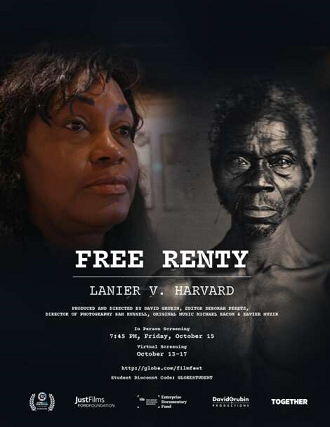
Free Renty: Lanier v. Harvard 2021
Distributed by Collective Eye Films, 1315 SE 20th Ave. #3, Portland OR 97214; 971-236-2056
Produced by David Grubin
Directed by David Grubin
Streaming, 95 mins
High School - General Adult
African American History; Civil Rights; Justice
Date Entered: 12/12/2022
Reviewed by Gisèle Tanasse, University of California BerkeleyDavid Grubin’s feature length documentary, Free Renty: Lanier v. Harvard, expertly showcases Tamara Lanier’s fight for justice, grounded in the question, “Who owns the rights to the violence of the past? Is it the victim or the perpetrator?” Throughout the film, we witness Lanier’s heartbreaking efforts to reclaim not only her great-great-grandfather Papa Renty’s daguerreotype, but also his reputation and the use of his likeness, which were stolen by the racist pseudoscientist and Harvard faculty member, Louis Agassiz. While Renty’s likeness was first exploited to justify not only continued enslavement, but white supremacy generally, Harvard continues to license the image and thereby profit from it. The film features in-depth comments and perspectives from Renty’s descendants, prominent attorneys focused on racial justice (including the brilliant Benjamin Crump) and thought leaders from Ta-Nehisi Coates to scholars Tina Campt, Ariella Azoulay and Brian Powers. The myriad ways in which Harvard has failed and continues to fail Renty, his daughter Delia (stripped bare to her chest and crying, in the daguerreotype they hold), as well as Tamara Lanier, and her daughters, who are reliving this intergenerational trauma, are astounding and shameful.
As of this writing, Lanier and her legal team are still being stonewalled by Harvard, both in the judicial system and through Harvard’s unwillingness to engage in a restorative justice process. While there is no happy ending to this documentary, it serves as a clarion for all institutions to get on the right side of history now, begging the question for our generation of librarians and archivists: which institutions will lead the great movement towards restoration and reparations?
This film is highly recommended for public and academic libraries, for a variety of community and instructional contexts, including courses focused on legal studies, ethics, public administration, library and information science programs, American history, African American Studies, human rights, slavery and cultural studies. Critical media studies courses would also benefit greatly from Campt’s profound yet very concise analysis of the uses of images to dehumanize young black men. Also of note: the Agassiz descendants’ efforts to support Lanier serve as a model for the role that ally descendants of white supremacists can play in navigating and interrogating around harm that was perpetrated by an ancestor.
Awards: Winner, Best New England Newburyport Documentary Film Festival
Published and licensed under the Creative Commons Attribution 4.0 license. Anyone can use these reviews, so long as they comply with the terms of the license.